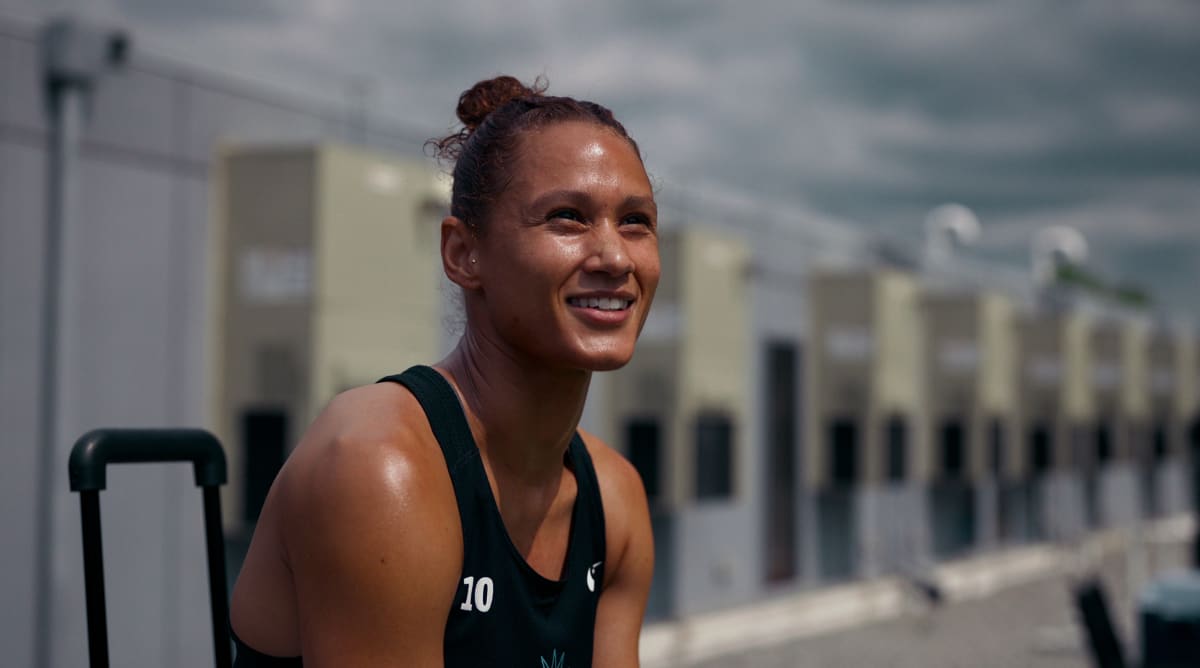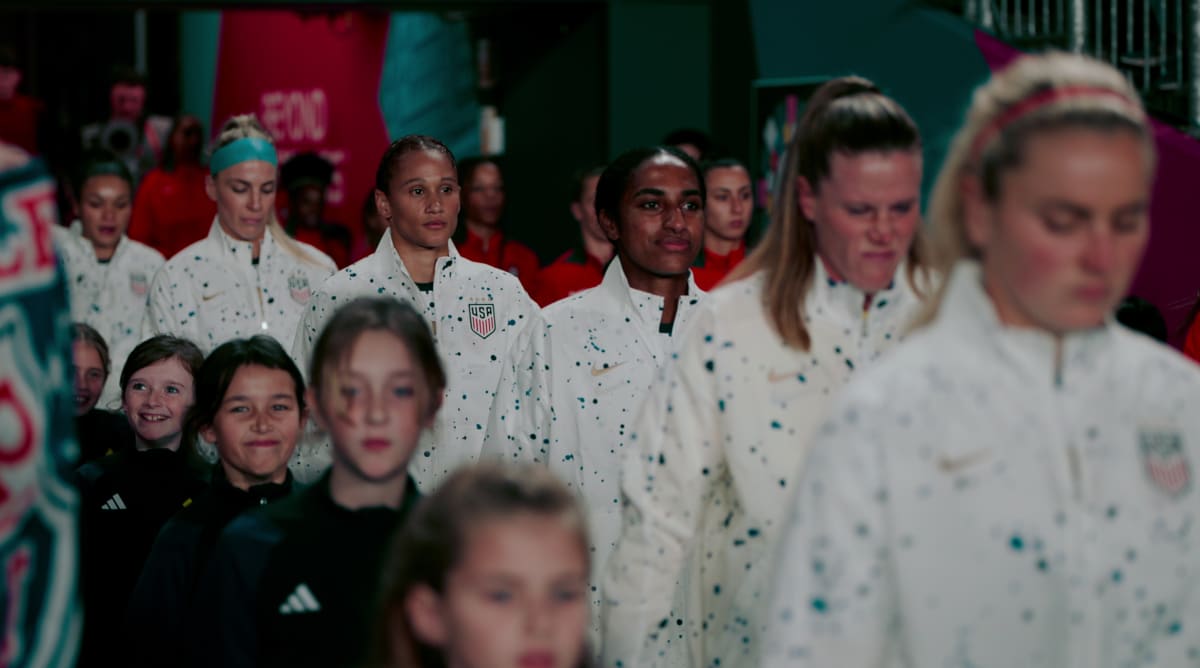You may think you know how the U.S. women’s national team’s 2023 World Cup journey ended. One millimeter, a tense penalty kick shootout against Sweden and a heartbreaking Round of 16 exit. There’s more to the story, though, as the Netflix series, Under Pressure: The U.S. Women’s World Cup Team, uncovers.
The four-episode documentary follows the USWNT through its preparation for the World Cup, the tournament itself and its heart-wrenching aftermath. Zooming in on star forward Lynn Williams, along with veteran Alex Morgan, teenage phenom Alyssa Thompson, Gotham FC midfielder Kristie Mewis and national team newcomer Savannah DeMelo, Under Pressure provides an intimate look at the mounting stakes of the USWNT.
Reflecting on the series’s backdrop of the World Cup can, understandably, be complex, as it is for Williams, who serves as a focus for the project.
“I would describe it as the most amazing experience for women’s soccer, but also a very humbling and confusing moment on an individual level,.” Williams says of the tournament.
Has she gotten closure from the World Cup confusion?
“No. I don’t think you get closure,” says Williams. “I think that sometimes in life you just have to move on. You don’t get to ask every single question you want answered and sometimes you can ask, and they don’t answer in many ways.”

Courtesy of Netflix
The 30-year-old’s insightful candor anchors Under Pressure, with Williams opening up about her unique position on the squad. At one point, she tells the cameras: “I have waited behind Megan [Rapinoe], Christen [Press], Alex [Morgan], who are these legends of the game.” Sandwiching her on the other side, Williams explains, is an influx of young talent (think Trinity Rodman and Sophia Smith). The Gotham FC striker is a perennial underdog, despite being a four-time NWSL champion and one of the best—if not the world’s best—defensive forwards (a point laid bare in the series).
“I have definitely felt like I have had to prove myself over and over and over again,” Williams says. “Everybody will say this. Every roster, every game, every training you have to fight to get there and stay there. It’s not just getting there. It’s about staying there, which is the hardest part.”
The Netflix series is a chance for audiences to see Williams and the rest of the group navigate nearly unprecedented levels of intensity and scrutiny, but in true USWNT fashion, the documentary is just as much about the program’s collective impact as it is about any individual.
“The U.S. has always felt this responsibility to continue to push forward women’s sports, and one of the things we talk about is coverage,” Williams says. “And we just need more coverage and more eyes on us, so this was one way to do that.”
Rebecca Gitlitz, the two-time Emmy award-winning director of Under Pressure, shares in Williams’s sentiment, calling the USWNT her “white whale.” She sat down to talk about the making of the series, including what sets this U.S. team apart from nearly any other group or figure in sports.
This conversation has been edited for length and clarity.
Sports Illustrated: The three-peat sets the stakes pretty high. What was your vision when you signed on for this project?
Rebecca Gitlitz: This was my white whale. I wanted this story so badly. I have been dreaming about a story of powerful women who have willed themselves into this sort of pinnacle of power and competition. And that is this team. And I wanted to be a part of the story and I wanted to be able to paint women’s sports in a way that I think that they should, which is just as athletes and not as women athletes. And I think that what I set out to do was show that this team has so much to give and so much that we should be thankful for and they are powerful in a way that we haven't seen before. And so, while the World Cup was the spine, I think the larger story of this women’s soccer team was at the heart.
SI: I’m sure once at the World Cup, things started to go in a different direction than the team or anybody thought was going to happen. How did you adjust as the trajectory of the tournament came into view? How did you change direction?
RG: What’s interesting is that we didn’t change direction. I think we stayed the course of pressure. Pressure was singularly our focus in showing how much pressure this team has in a three-peat, how much pressure this team has on the heels of equal pay, how much pressure this team has in young players, in a new coach, in an aging team. So as the tournament unfolded, and as they have a 3–0 win over Vietnam and all of a sudden it’s full criticism, you saw that pressure was only going to rise and the noise was only going to get louder, and so we followed that story line really hard. And so the Netherlands and the pressure coming up to them, I think we stayed the course and we followed how much chatter there was and how much just noise was coming at them all the time. The pressure was constantly building, and that became our backbone.
SI: In making the film, did you think about the concept of pressure, or is there something that was uncovered about the concept for you in making this film and following this team?
RG: I think that I really tried to channel it into myself and into our team. This is so funny, there was this huge poster outside the F station at Broadway-Lafayette [in Manhattan], which was right at our edit room. And it was Alex Morgan in full Calvin Klein. And every single morning I would get out of the subway and I would be like you know what, Alex is a mother and she is saddled with a lot of the responsibility, and she still goes out there and she still competes every single day. And if she can do it, I can do it. And I think it became this sort of representation North Star for me that I would walk into the edit room every day and I would put on a brave face and I would say we have this. No matter how many logistical problems we have, no matter how many thematic problems we have, we’re going to do this and we’re going to do it well because they deserve it. And it sort of became a no matter what pressure we’re under, it’s bigger for them and so we’re going to do it for them.

Courtesy of Netflix
SI: You got a lot of different types of players at different points in their careers. What was the process like of deciding who was going to be featured in the film?
RG: I think that was exactly the point. Kelley O’Hara has this great line about how a U.S. national team jersey is borrowed and your position is never secured and you never know who is coming behind you. And I think that when Lynn Williams talks about Mal [Swanson] going down [before the tournament], and she has such empathy but she also has so much fire in her, that’s sort of really indicative of the way that this team works. Because you’re constantly fighting for your spot and even if you’re Alex Morgan, who has won all of the things, or even if you’re an 18-year-old phenom like Alyssa Thompson, nothing is a given. So, we wanted to showcase these different lanes that U.S. women’s national team players exist in and how the pressure for each of them is different.
SI: The emotional peak of the series is when everyone is getting their calls from Vlatko [Andonovski] saying they’re going [to the World Cup]. What was that like to capture?
RG: There is a scene in Argo where the hostages are on the plane, and we know the story—this is from the ’70s, right? We know that the plane is going to take off. But when I sat down to cut that scene with our editors, who are just beautiful storytellers, that’s what I wanted. I wanted the emotion, the music, the feeling to think, Yeah the tournament is over and you knew Kristie Mewis was there. But when you watch this scene, do you know? Can you feel her heart beat out of her chest? And it’s the same way we approached Sweden and the penalties. No matter how many times you watch that, your heart is beating outside of your chest. It’s like you don’t know, and I think I wanted that so badly to come through. The pressure in those rooms was palpable, and we tried to cut it the way we lived it.
SI: And you see them all, the first thing they do, they hug their families. Why was that an important element? I think there was a good amount of time spent seeing the people that make up these players’ lives.
RG: If you don’t connect with characters, you don’t connect with a story. And I think that these characters, these people are something different off the field. I think to understand the pressure and the story, you have to understand that these are well-rounded people that have lives, that have sacrificed, that exist outside the jersey as well. So I didn’t want to only make a soccer film. This isn’t a soccer film. It’s a story of people who are athletes and play a game at the highest level. But at their core, they’re human beings with feelings and families and fears. To break through, to not just be a soccer film, you have to explore the lives and the complexities of the people that live it.
SI: You’ve covered so many sports figures and teams. I am curious, from your perspective—I think everybody can maybe guess what makes the U.S. women’s national team unique—but being around them, what do you think sets them apart as a team?
RG: I think it’s the longevity. In a lot of the stories that I’ve covered, the only time I’ve seen this sort of continued excellence is with Pat Summitt and what she did with Tennessee [women’s basketball]. The reason I compare the two is because what Pat Summitt had, you can’t teach. It’s inside, it’s like this value system and this will to be better, to be greater, to dream bigger and to force others around you to do the same. And that’s what this U.S. women’s national team has done for generations, is force other people to get on board. And I love that about them. I love that some of them do it quietly; some of them do it very loudly. But they all sort of force change in a way that you might not even recognize in yourself, but when you look at them back you’re like, My god, what have they given us?







